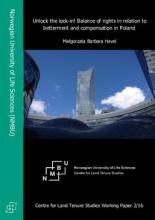Land Library Search
Through our robust search engine, you can search for any item of the over 73,000 highly curated resources in the Land Library.
If you would like to find an overview of what is possible, feel free to peruse the Search Guide.
/ library resources
Showing items 19 through 27 of 114.Many Polish cities are faced with a dilemma: to enact their local land-use plans and be exposed to the immediate financial consequences of their adoption, or to protect their budgets against these costs and give up control of the development of the cities.
The problems of agricultural land (AL) market state regulation have been analyzed, including the shortcomings of the new law concerning withdrawal of land plots from lands of agricultural purpose in case of non-use of them for the intended purpose.
Changes to the legislation governing the state registration of rights to immovable property and their encumbrances aimed at simplifying relevant procedures, they will improve the existing legal regulation in this area and are designed to ensure the safety and protection of the rights and legitima
Ownership of assets is important for poverty reduction, and women’s control of assets is associated with positive development outcomes at the household and individual levels.
The idea behind this initial survey is simple: to find out if people in India are worried about their existing property rights or lack of them - whether women or men, owners or tenants, in cities or in villages. The survey results reveal that insecurity of property rights is widespread in In
This paper argues that Russia's choice of economic organization, which is based on the renewed role of the state, is a response to the existence of severe transaction costs, and subsequent mitigation of contractual incompleteness in the absence of a strong property rights system.
In this article, the attempt is made to address regime interaction in environmental governance by emphasising human livelihood action as a causal factor in this interaction.
Until recently, the Pokot in the highlands of the Baringo area in Kenya have practised semi-nomadic pastoralism. Today they are rapidly sedentarizing and in many areas suitable for farming, they are adopting rain-fed agriculture.
In Afghanistan, insecurity over land and water rights hampers investments in food production and irrigation. In rural areas, customary tenure systems, partly based on religious law, are the most relevant but suffer from weak recognition and offer little protection to rights holders.





